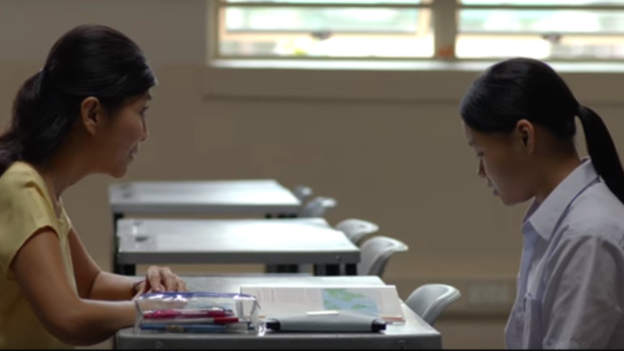Asia/Singapur/09 de Septiembre de 2016/Fuente: BBC News
RESUMEN: El sistema educativo de Singapur, uno de los mejores en el mundo, es conocida por su énfasis en los grados y exámenes. Pero un video por el Ministerio de Educación (ME) sugiere que la actitud podría estar cambiando. El corto, basado en una historia real, muestra a la Señora Pua, un profesora de Geografía, haciendo todo lo posible para alentar y ayudar a su estudiante Shirley, que sigue fallando en sus pruebas. A pesar de todo su trabajo duro, el entusiasmo y el progreso, Shirley sigue sin su próximo examen, pero se siente alentada por la Señora Pua, el éxito no es acerca de las calificaciones, pero hace todo lo posible. «Alienta ver el Ministerio transmitir este mensaje. Es un pequeño paso hacia un objetivo mayor, donde los estudiantes reciben una educación integral más allá de los conocimientos académicos Felicitaciones» dijo un mensaje en la página de Facebook del Ministerio de Educación en respuesta al video.
Singapore’s education system, one of the best in the world, is known for its emphasis on grades and examinations.
But a video by the Ministry of Education (MOE) suggests that attitude might be changing.
The short film, based on a true story, shows Madam Pua, a geography teacher, trying her best to encourage and help her student Shirley, who keeps failing her tests.
Despite all her hard work, enthusiasm and progress, Shirley still fails her next exam, but is encouraged by Madam Pua that success isn’t about the grades but trying her best.
«Heartened to see the Ministry conveying this message – it’s a small step towards a greater goal where students receive a holistic education beyond just academic knowledge. Kudos!» said one post on the MOE’s Facebook page in response to the video.
«Liked that the advertisement didn’t end dramatically, [with the student] scoring high marks. Inspiring!» another commenter said.
«Tearing like a baby now,» said another.
‘Try convincing parents’
The MOE said the video, released last Friday to mark Singapore’s Teacher’s Day, looked to «reinforce the holistic development of students».
«Our teachers have always been focused on character building and making a difference in our students’ lives in school and beyond,» it said.
The country has also been introducing new programmes for secondary schools, with a greater value placed on arts and outdoor education.
But some say there is still some way to go before societal attitudes change.
«This ad is so misleading. I’ve seen teachers contacting parents if their kids don’t do well in school. Singapore’s education system is crazy,» one Facebook post read.
«This is just an ad,» said another post. «In reality, based on my own experiences, teachers like to put down students more than encourage them.»
«Try convincing the parents,» said another.
A recent government survey shows that families in Singapore collectively spend about $1.1bn Singapore dollars ($827m; £526m) a year on private tuition, nearly double the amount from a decade ago.
And it works – Singapore came first in the 2015 global school rankings, with the results based on maths and science. The UK came in at 20 and the US at 28.
Nicholas Ong, who graduated from Anglo-Chinese School (Independent), one of Singapore’s top schools, said that «kids who grow up in Singapore start running the rat race from an early age».
«My parents did not place many academic demands on me, but there was always a subliminal pressure from society to get good grades.»
One teacher at a junior college in Singapore, who didn’t want to give their name, told the BBC the ad could encourage «a new narrative amongst Singaporeans about education, that the process is just as important as the outcome».
«I think MOE is heading in the right direction to acknowledge, and even to some point, affirm various life routes beyond one that focuses on grades. [But] parents and students often fuel the stress about grades because of a narrow definition of what success can be.»
Fuente: http://www.bbc.com/news/world-asia-37293655







 Users Today : 8
Users Today : 8 Total Users : 35459603
Total Users : 35459603 Views Today : 18
Views Today : 18 Total views : 3417990
Total views : 3417990